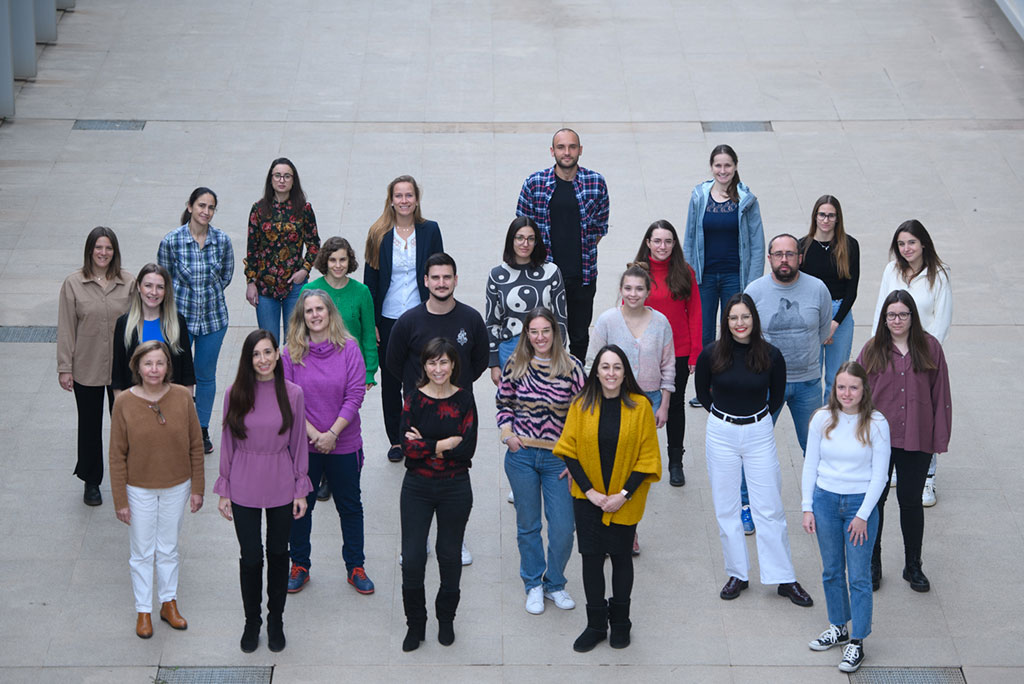We use polymer therapeutics, considered the first polymeric nanomedicines, to design novel treatments for several applications, including cancers, neurodegeneration, and tissue regeneration.
With many products already on the market, two of them top-ten best selling drugs in the USA (Copaxone and Neulasta), polymer therapeutics has already attained clinical proof-of-concept. However, new opportunities to expand and develop this technological platform still exist in areas such as:
- The delivery of single/combination anti-cancer agents directed against novel molecular targets.
- The development of novel polymeric materials with defined architectures.
- Treatment of diseases other than cancer, such as neurodegeneration.
The polymer therapeutics laboratory at the CIPF focuses on these exciting areas of investigation. Our research activity aims to design advanced polymer conjugates—novel therapeutic and/or diagnostic nanopharmaceuticals with applications in metastatic cancer, neurodegeneration, and tissue regeneration among others.
We are taking several approaches to try to achieve specific and effective therapeutic polymer treatments for a range of diseases and disorders. This includes the development of polypeptide-based biodegradable carriers, application of combination therapies, and design of nanoconjugates and hybrid systems that are specific to novel molecular targets.
Additionally, we have implemented quantitative tools to assess the in vitro and in vivo fate of polymer therapeutics. This has allowed us to investigate how spatial conformation affects trafficking, pharmacokinetics, and whole-body biodistribution, thus opening up the exploration of a range of future clinical applications.
Presentation
Get to know us better
Research Staff
The people who make it all possible
Maria Jesus Vicent Docon
mjvicent@cipf.es
Ana Armiñan De Benito
aarminan@cipf.es
María Medel González
mmedel@cipf.es
Maria Helena Ferrandis Jimenez
mhelena@cipf.es
Esther Masia Sanchis
emasia@cipf.es
Inmaculada Conejos Sanchez
iconejos@cipf.es
Zaida Maria Abad Jiménez
zmabad@cipf.es
Camilla Pegoraro
cpegoraro@cipf.es
Maria Ibañez Vives
mibanez@cipf.es
Amina Benaicha Fernández
abenaicha@cipf.es
Antoni Serrano Marti
aserrano@cipf.es
Karolina Gwizdala
kgwizdala@cipf.es
Publications
Our scientific contributions
Characterization of triple-negative breast cancer preclinical models provides functional evidence of metastatic progression
Arroyo-Crespo JJ, Armiñán A, Charbonnier D, Deladriere C, Palomino-Schätzlein M, Lamas-Domingo R, Forteza J, Pineda-Lucena A and Vicent MJ
INTERNATIONAL JOURNAL OF CANCER, 2019 Oct, DOI: 10.1002/ijc.32270, Vol. 145, pag. 2267-2281
Metabolomics facilitates the discrimination of the specific and-cancer effects of free and polymer conjugated doxorubicin in breast cancer models
A. ARMINAN, M. PALOMINO-SCHATZLEIN, C. DELADRIERE, J. ARROYO-CRESPO, S. VICENTE-RUIZ, M. VICENT and A. PINEDA-LUCENA
BIOMATERIALS, 2018 Apr, DOI: 10.1016/j.biomaterials.2018.02.015, Vol. 162, pag. 144-153
Anticancer Activity Driven by Drug Linker Modification in a Polyglutamic Acid-Based Combination-Drug Conjugate
J. ARROYO-CRESPO, C. DELADRIERE, V. NEBOT, D. CHARBONNIER, E. MASIA, A. PAUL, C. JAMES, A. ARMINAN and M. VICENT
ADVANCED FUNCTIONAL MATERIALS, 2018 May, DOI: 10.1002/adfm.201800931, Vol. 28, pag.
HIF-1 alpha inhibition by diethylstilbestrol and its polyacetal conjugate in hypoxic prostate tumour cells: insights from NMR metabolomics
A. ARMINAN, L. MENDES, J. CARROLA, J. MOVELLAN, M. VICENT and I. DUARTE
JOURNAL OF DRUG TARGETING, 2017 Jan, DOI: 10.1080/1061186X.2017.1358728, Vol. 25, pag. 845-855
Capturing "Extraordinary" Soft-Assembled Charge-Like Polypeptides as a Strategy for Nanocarrier Design
A. DURO-CASTANO, V. NEBOT, A. NINO-PARIENTE, A. ARMINAN, J. ARROYO-CRESPO, A. PAUL, N. FEINER-GRACIA, L. ALBERTAZZI and M. VICENT
ADVANCED MATERIALS, 2017 Oct, DOI: 10.1002/adma.201702888, Vol. 29, pag.
FUNDING
Thank you for supporting us






















